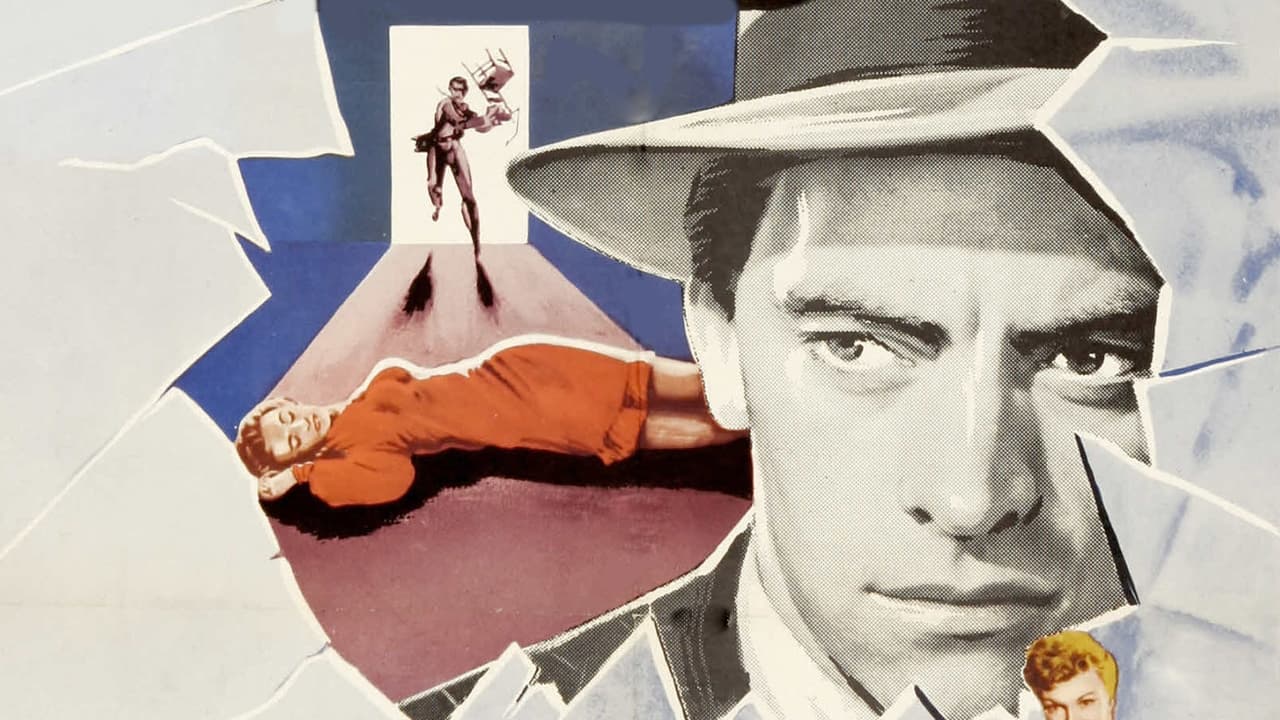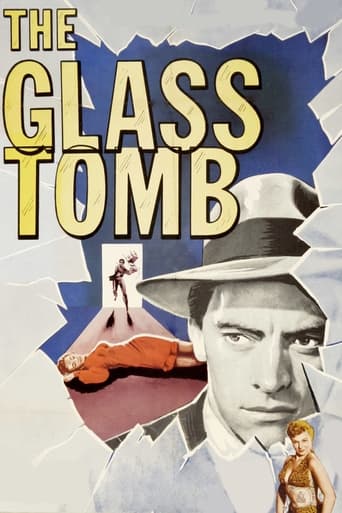

THE GLASS CAGE is a brief and snappy murder thriller from those chaps at Hammer Films. It's a bit cheaper than most of their productions but it's nonetheless a solid addition to the sub-genre of murder mystery films with a circus or fairground setting. American import John Ireland plays a carnival proprietor whose latest act is to showcase Eric Pohlmann's starving man, who literally sits in a glass cage and doesn't eat for months while the crowds flock to see him. In a slightly artificial plot, a murderer is at work, bumping off peripheral characters left right and centre, with Ireland at the heart of it. This film is too short and low budget to do little more than join the basic dots, but the excellent cast sees it through nicely. Honor Blackman and Sid James appear early on and never do so again; Sam Kydd gets to do more than his usual cameo; Ferdy Mayne and Bernard Bresslaw are fellow 'exhibits'; Sydney Tafler and Geoffrey Keen a pair of hangers-on. Liam Redmond's drawling Irish detective is the highlight here.
... View MoreThanks to the enterprise of Kit Parker Films, much of Hammer's noir output in now available on excellent DVD transfers from VCI. Pick of the bunch is "The Glass Tomb" (1955), starring an appropriately glum John Ireland, and superbly photographed in a stunningly noirish manner by Jimmy Harvey (who once told me he was Lilian Harvey's brother). And most importantly of all, in my opinion, directed (at least in some scenes or maybe all of them) by Joseph Losey, who was actually working for Hammer at this time.Frankly, there's no way in the world that the stunningly noir lighting, set-ups and acting could have been supervised and/or directed by Montgomery Tully. But I'm not surprised Losey made no move to claim this movie, because the story, while decidedly macabre, is somewhat unbelievable. Nonetheless, the script does feature perennial minor villain, Sydney Tafler, in his best role ever; and it also offers some riveting opportunities for Geoffey Keen, Sid James and Liam Redmond. Even Sam Kydd has a good part, though it must be admitted that the lovely Honor Blackman is wasted in a nothing role.
... View MoreOne of the must-sees out of the films produced by Robert Lippert in partnership with UK's Hammer studios. Taking advantage of arrangements favoured by the UK's Eady levy (a state film subsidy established after the war) in 1950, the producer formed a business alliance under which he would provide American acting talent - frequently shop-worn stars or just supporting actors who fancied a profitable trip out of the country - while Hammer would supply the rest of the cast and the production facilities. Together they would split the profits. Famous for his concern with the bottom line, Lippert produced over 140 films between 1946 and 1955, characteristically genre pieces such as I Shot Jesse James or Rocketship XM. For the British deal, most of the films were noir-ish thrillers. None were entirely of the first rank, but they remain never less than entertaining.Noir narratives set in and around carnivals have a small but proud heritage, stretching back to Nightmare Alley and beyond. They frequently juxtapose deformed outcasts of the sideshow with the twisted psychology on show elsewhere. The Glass Tomb concerns Pal Pelham (John Ireland), and his forthcoming attraction Sapolio 'The Starving Man', whose act is to go foodless for 70 days whilst locked, Blaine-like, in a glass booth. "I like being my own boss. I like freaks," says Pal at one point, clearly preferring the company of his performers to some others around him. When big-hearted bookie Tony Lewis (Sidney James, a characteristic performance) asks Pal to speak to a woman who has been blackmailing him, she shortly ends up dead, and the killer thinks Sapolio can identify him. Pal, who previously knew the victim, needs to solve the case. Geoffrey Keen, much more familiar to British cinema-goers from numerous stolid establishment roles, gets to play an unsympathetic role as Stanton the murderer.What's interesting about The Glass Tomb is that it is built almost entirely around recurring displays of appetite and denial. Whether it's Sapolio, greedy at home, and finally poisoned by strychnine-covered ham, or the fridge raid of Pelham's young son, the ticket-booth man secretly coveting his bottle of booze, then those who eat so unconcernedly in front of the incarcerated Starving Man, it's a world clearly defined. At a necessarily less explicit level there's also the carnal desire of Stanton and Lewis for the girl - Stanton's two hours alone with her corpse, for instance, is never explained. Tully manages some striking scenes on a budget, notably the performer's party, held while the body of the freshly killed girl lays undiscovered upstairs in her squalid room. The Glass Tomb has its weaknesses - it could have done with a few more freaks - but is baroque and perverse enough to be better known. Ireland gives an adequate performance, and Honor Blackman, in a demure role, plays his wife. Some will also notice Arthur Howard, the brother of Leslie, later to appear in the minor British nudie cult item Paradisio (1961) in a small part. Part of the Hammer Noir box set series where it enjoys audio commentary.
... View More"I want more chocolate!" says the sticky-faced tyke. "A clout is what you'll get!" says his frazzled mum. "Now turn around and watch the man starve like a good boy." The man is the great Sapolio, who is locked in a glass crypt determined to go 70 days without food. Pel Pelham (John Ireland) is selling tickets to this carny sideshow. He figures the pickings will be rich for 70 days as people pay to see whether Sapolio can hold out, give it up or die trying. However, there is one person who is going to opt for the last option. This man killed a young woman and he believes Sapolio may have glimpsed his face. Sapolio tells Pel and the police he cannot remember, but Pel knows Sapolio is a man who will never let things drop. Sooner or later Sapolio, locked in the glass cage with dozens of people staring at him, will finger the murderer. Sapolio may have considerably fewer than 70 days ahead of him. Except for John Ireland, a handful of interesting British actors, and an amusing but unlikely setup, this is all there is. There's no mystery; we know the killer. And because the writing and directing are so matter-of-fact, there's little energy and even less suspense. Ireland made this British movie in 1955. It takes only 59 minutes to tell the tale but it often seems longer, especially when we're dealing with Ireland's precocious little boy and his loving but tremulous wife, played by Honor Blackman. Bits of the movie are just fine. Pel Pelham is an outsider, an unsuccessful promoter with something of a chip on his shoulder. He goes to wealthy bookmaker and old friend, Tony Lewis (Sid James) for some money to finance the Sapolio show. Tony writes him a check right then, but asks Pel to drop the "freaks" and come back and join him in the business. Pel takes the check and says, "I like being my own boss, Tony, and I like freaks." Ireland says that line with style. There's a party in Sapolio's apartment to celebrate the stunt he and Pel are setting up. There's a midget playing piano, a gorgeous woman who's effete husband has painted wings on her back, a very large man who sometimes sounds Russian and several more. They're all Pel's friends, all his "freaks," and they come across as happy, nice people. There's a scene in a subway where the killer is considering whether or not to push a blackmailer under the wheels of an oncoming train. He almost does it, and the play of emotions on the actor's face is wonderful. But when those 59 minutes are up, there's not much to look back on one way or the other.
... View More